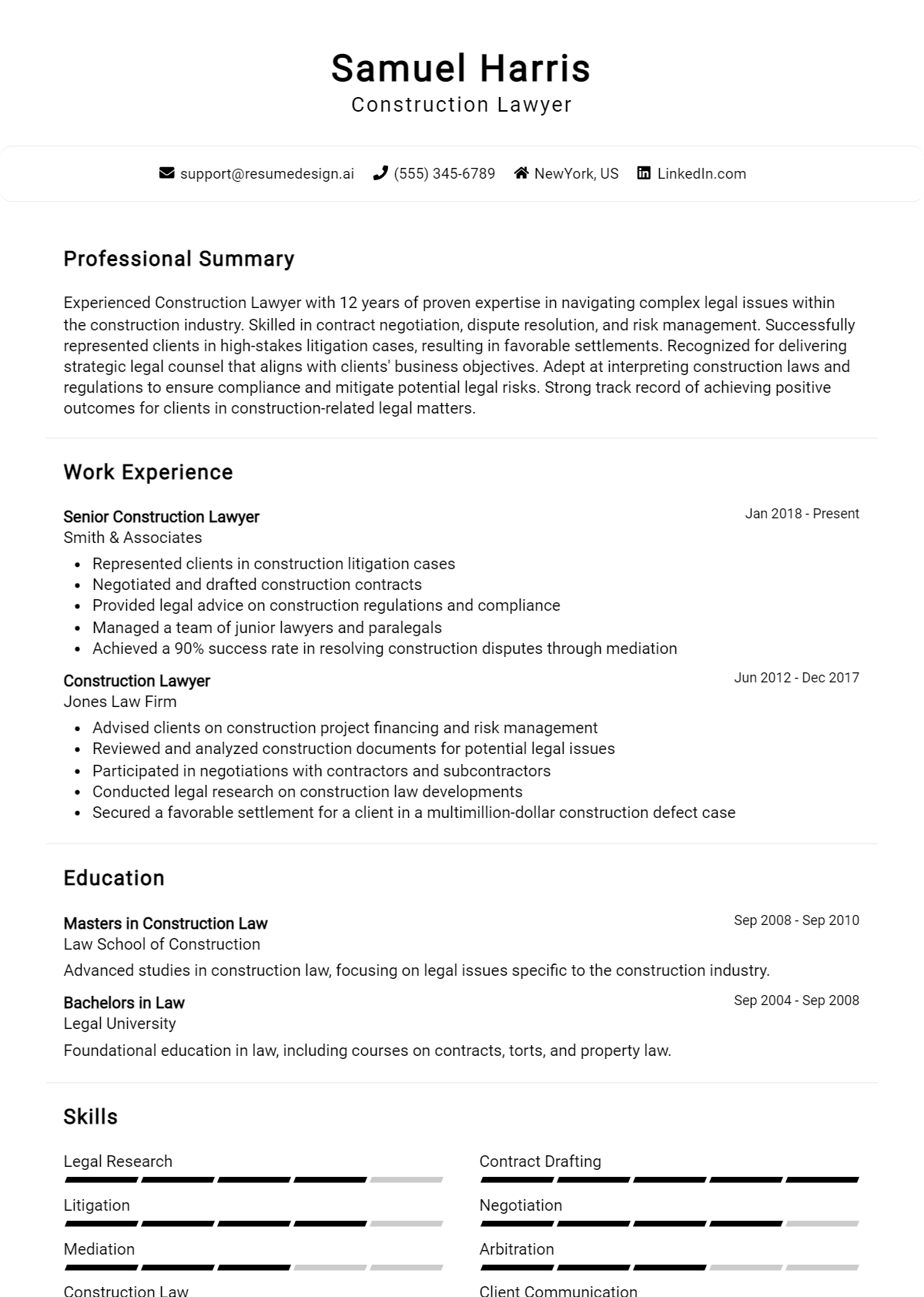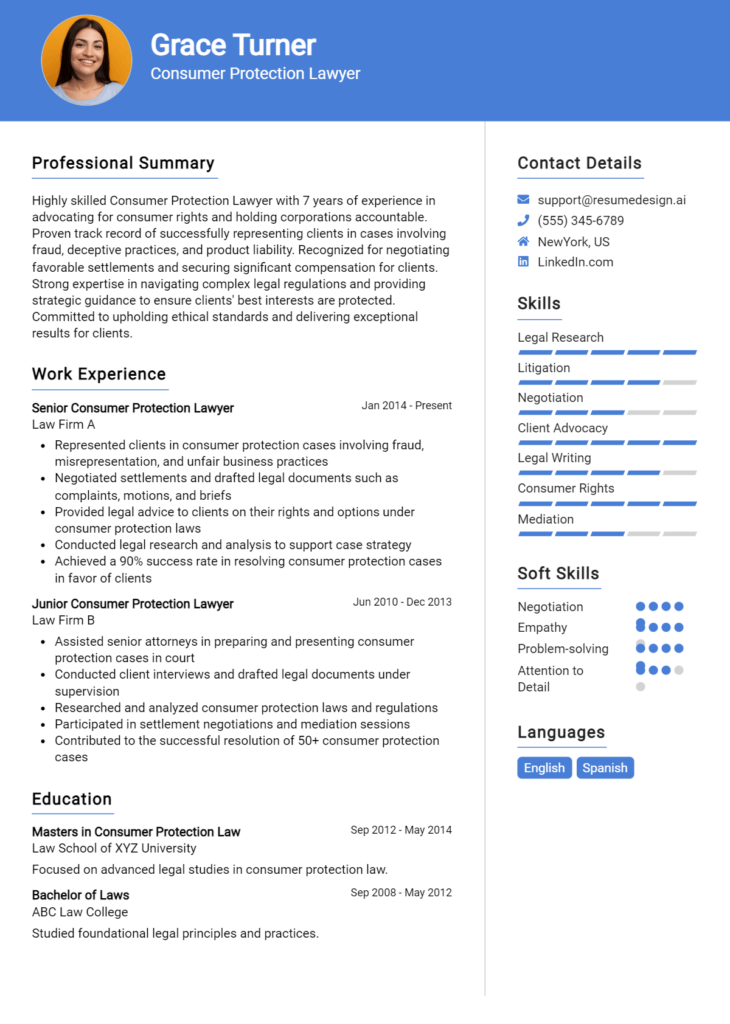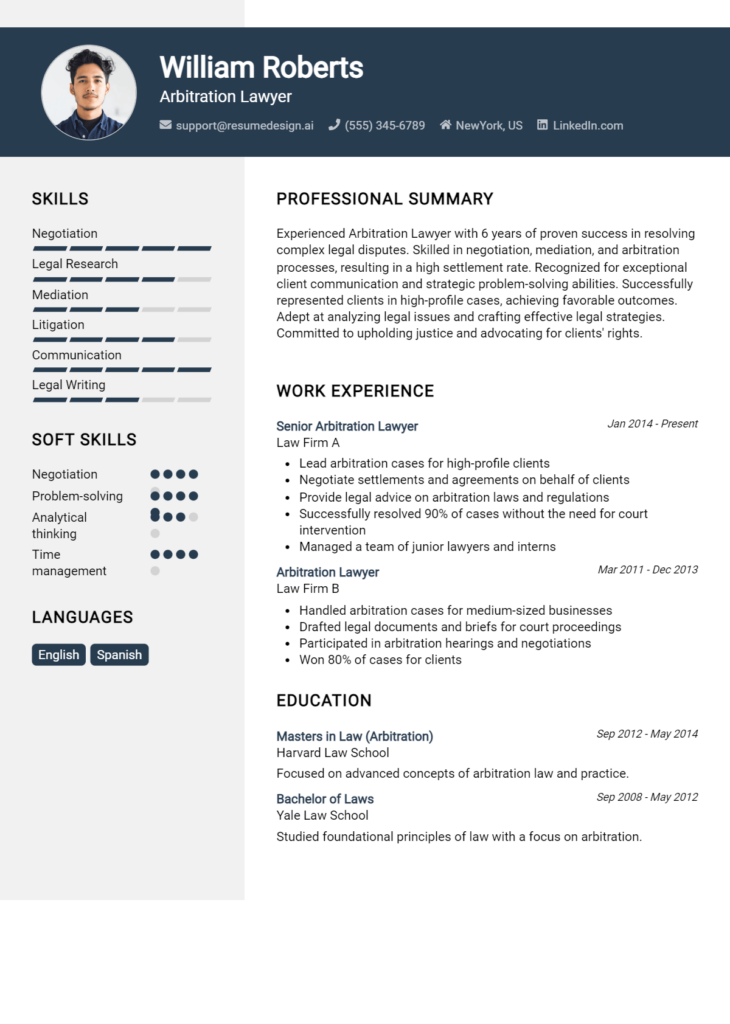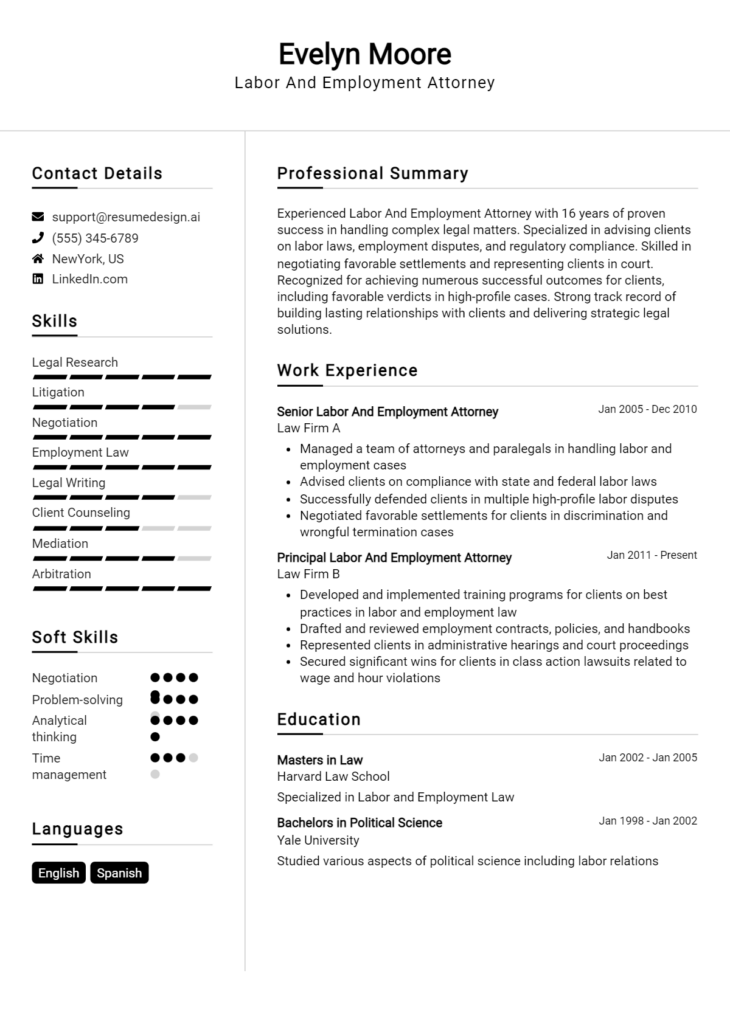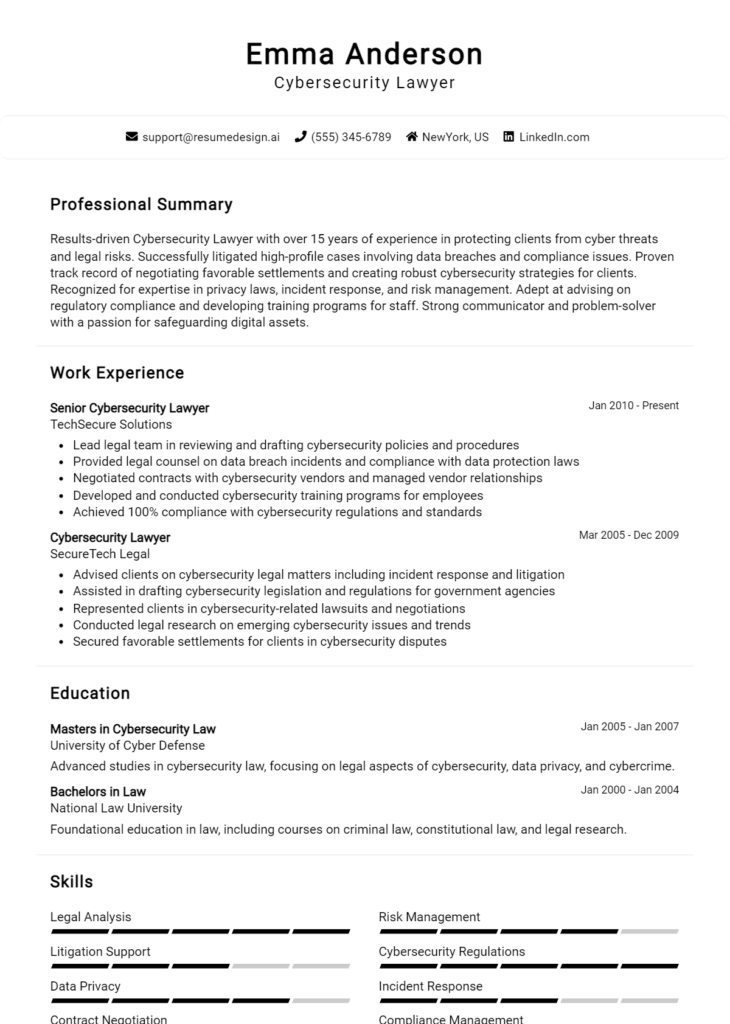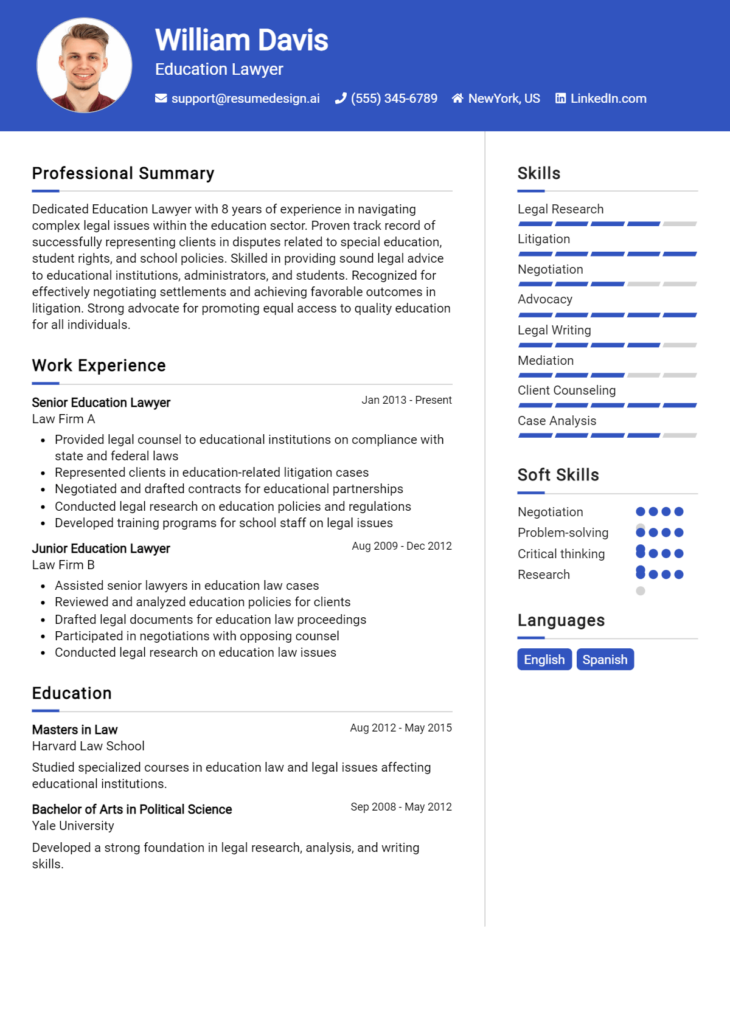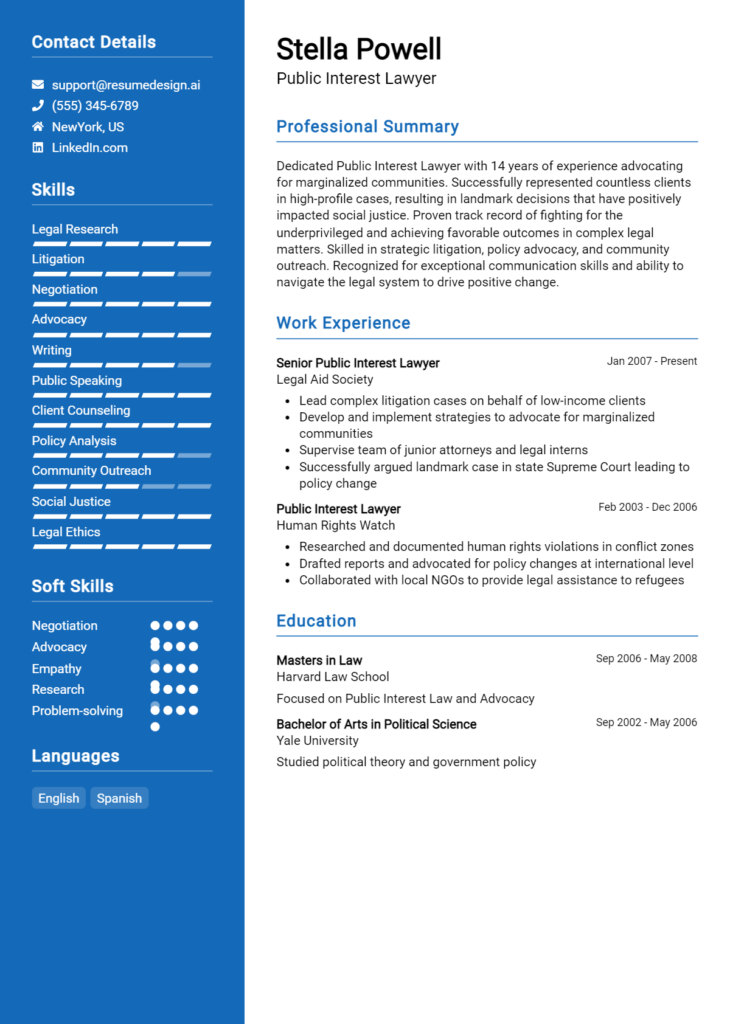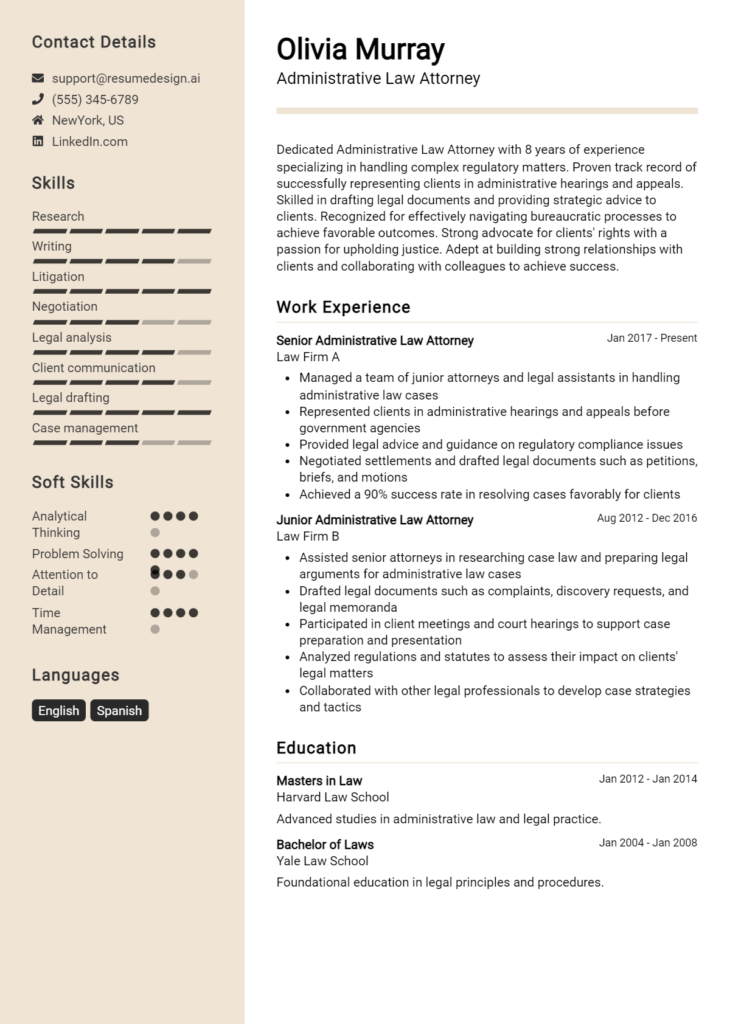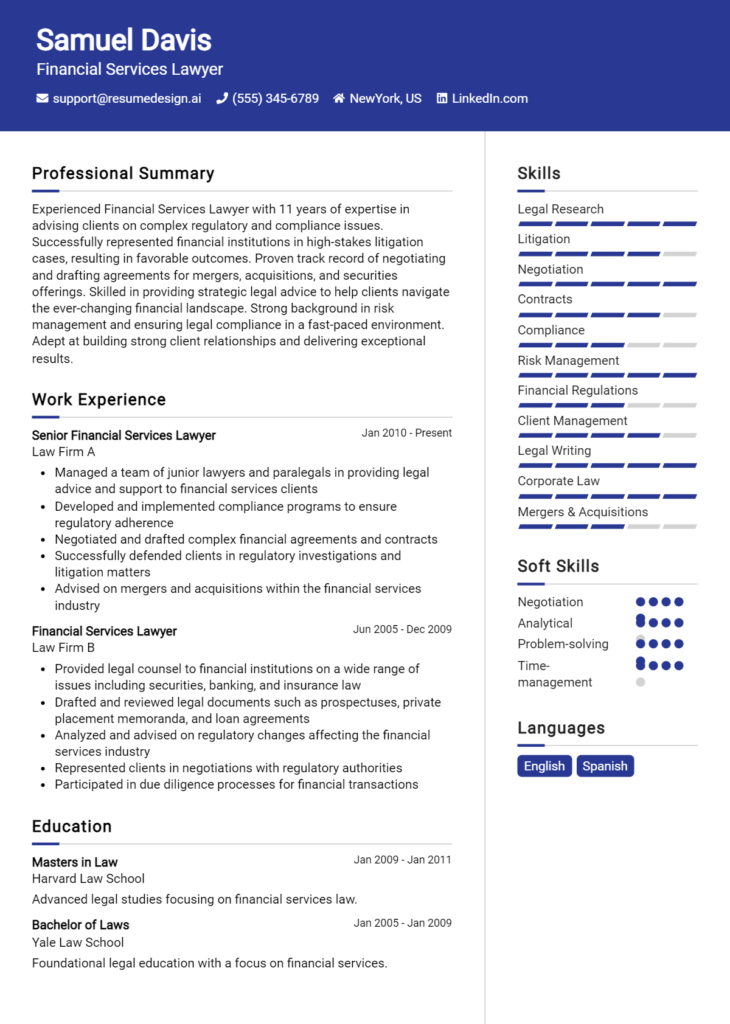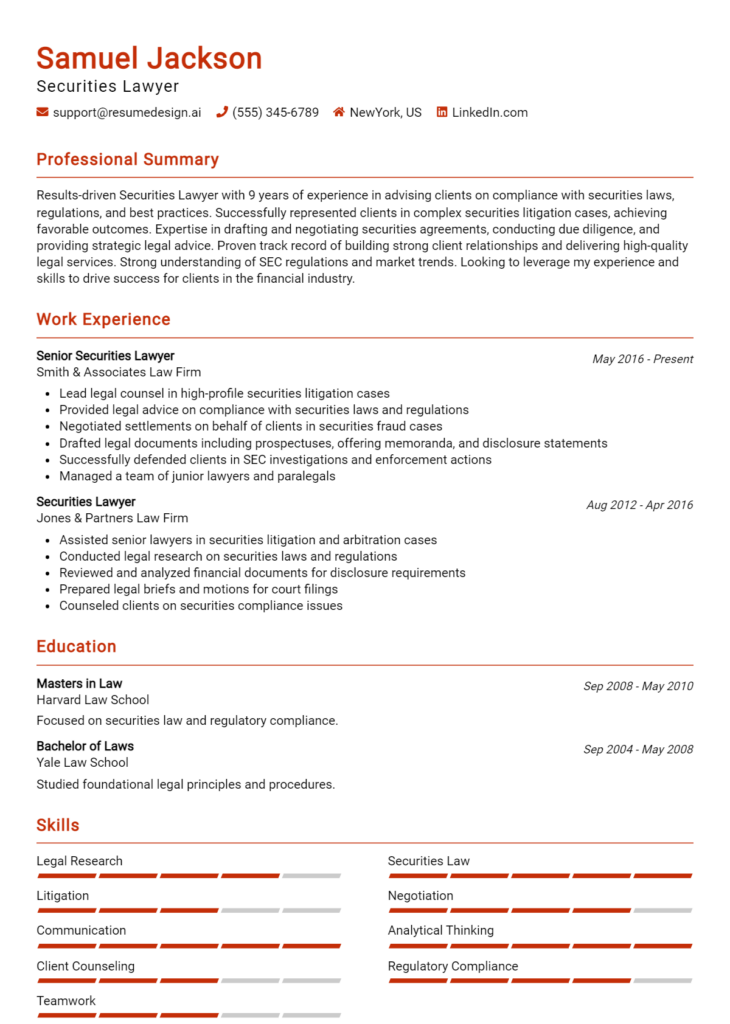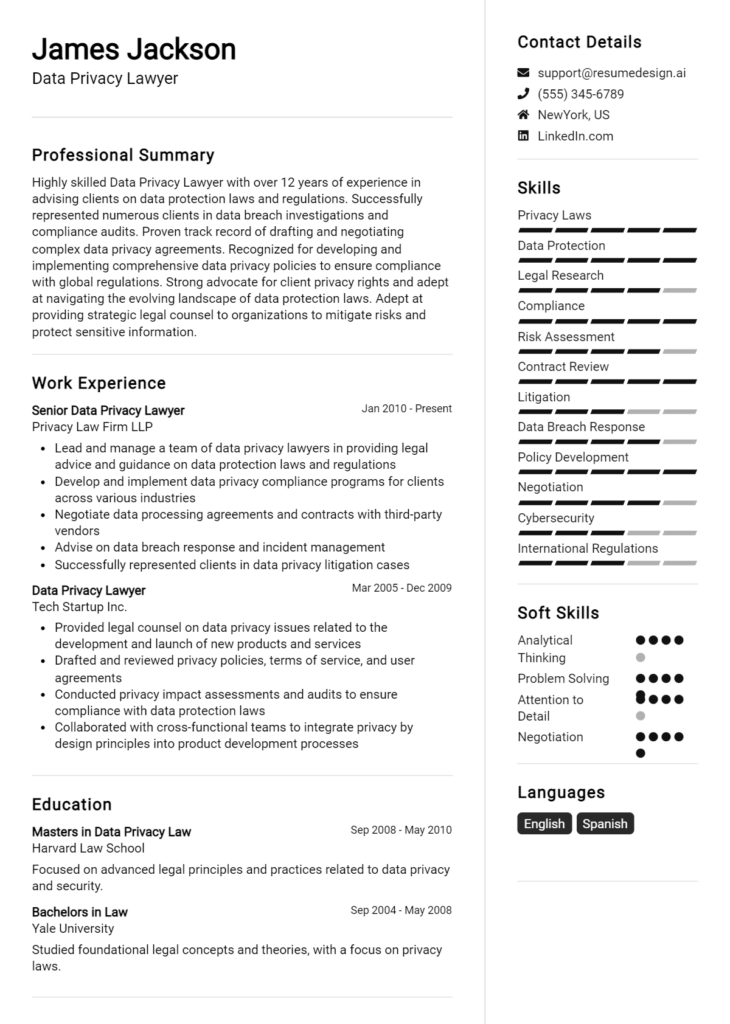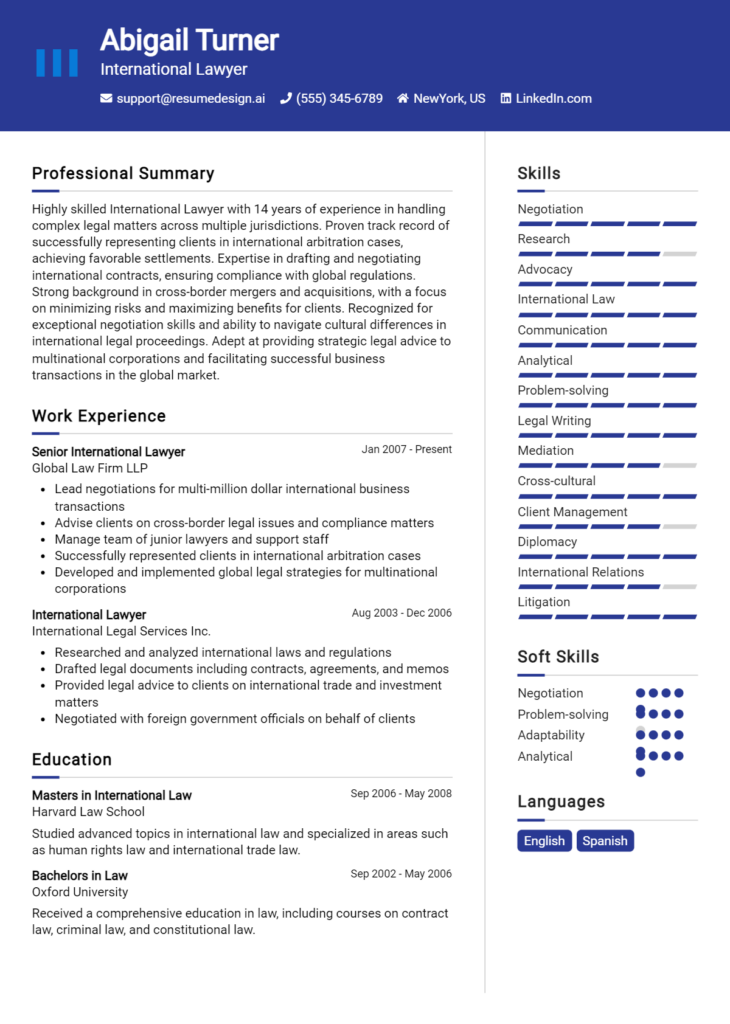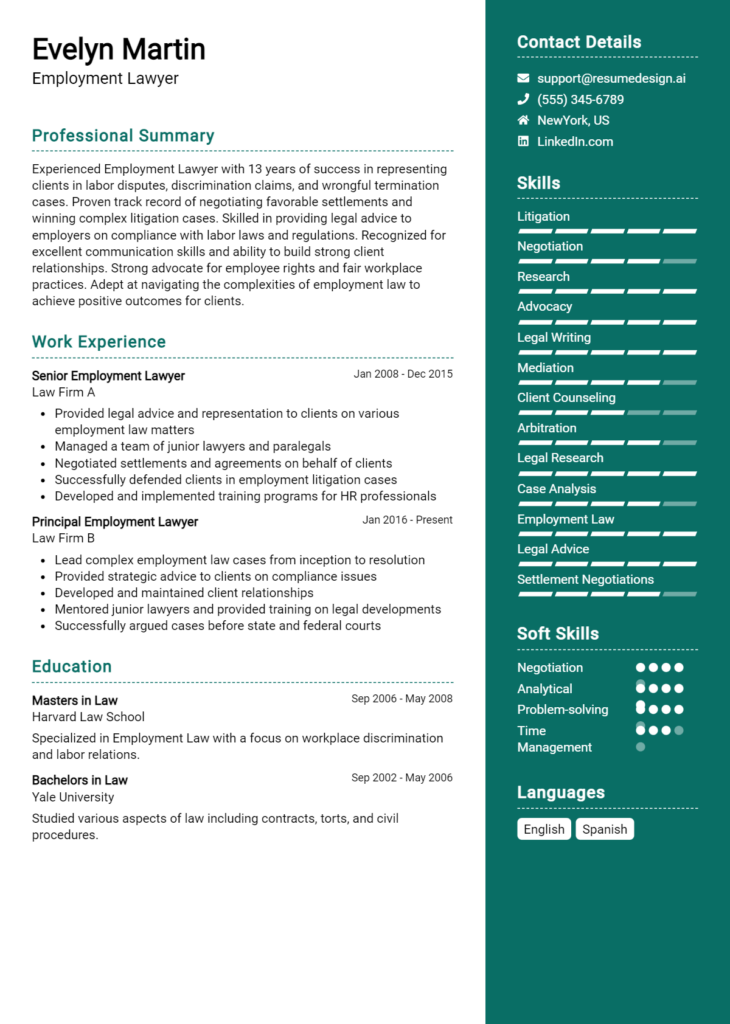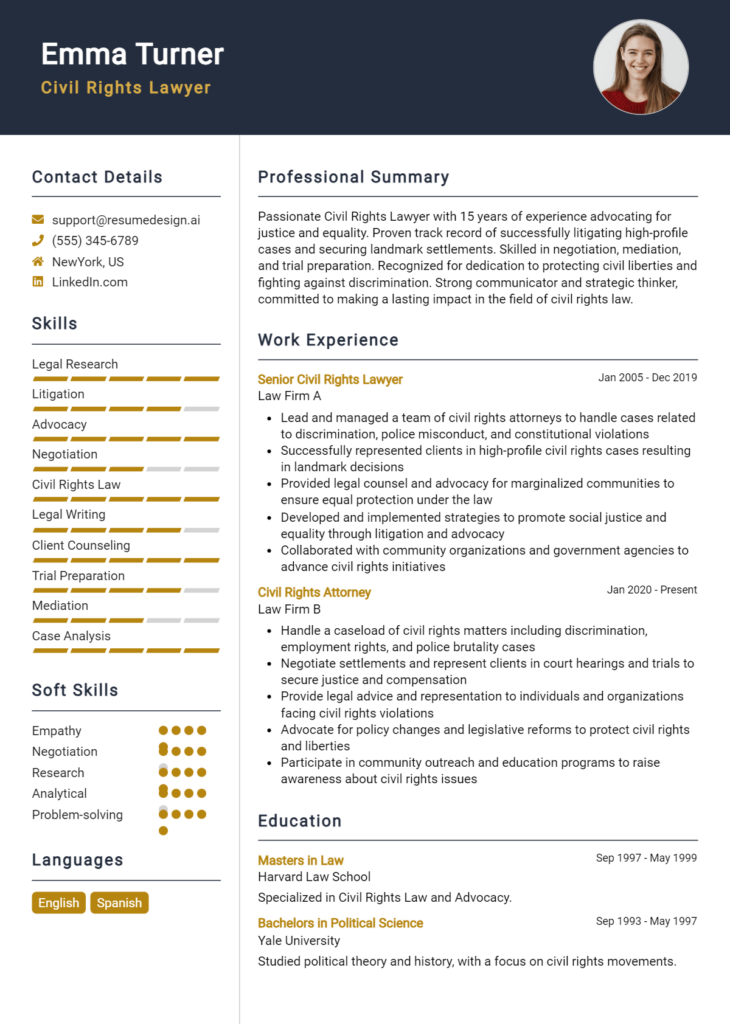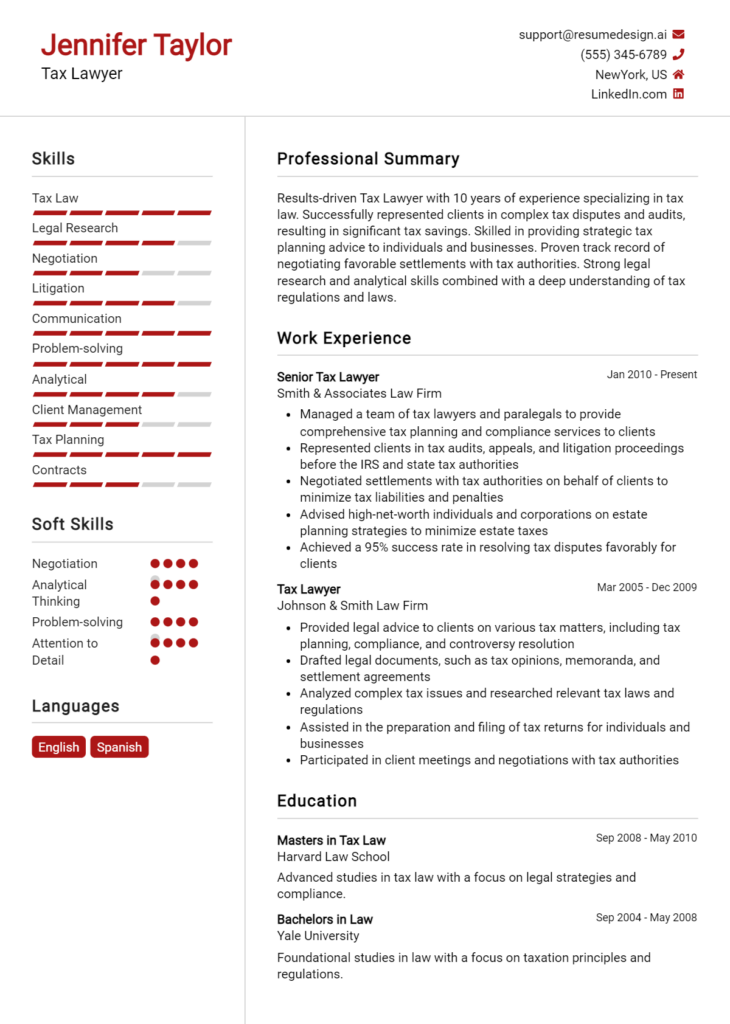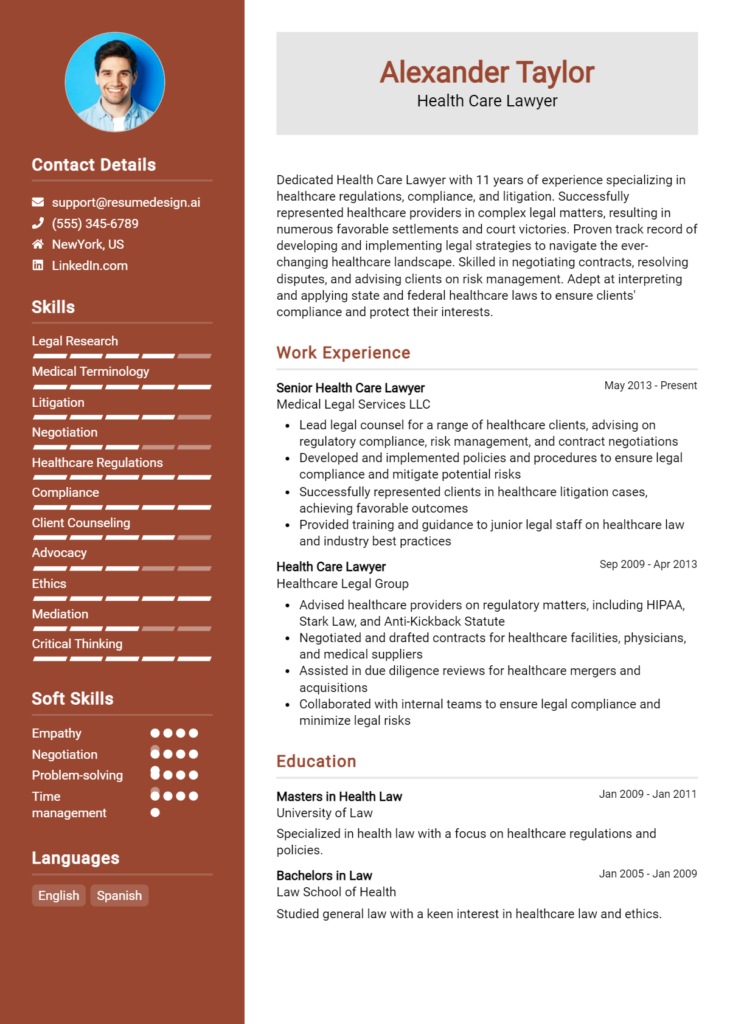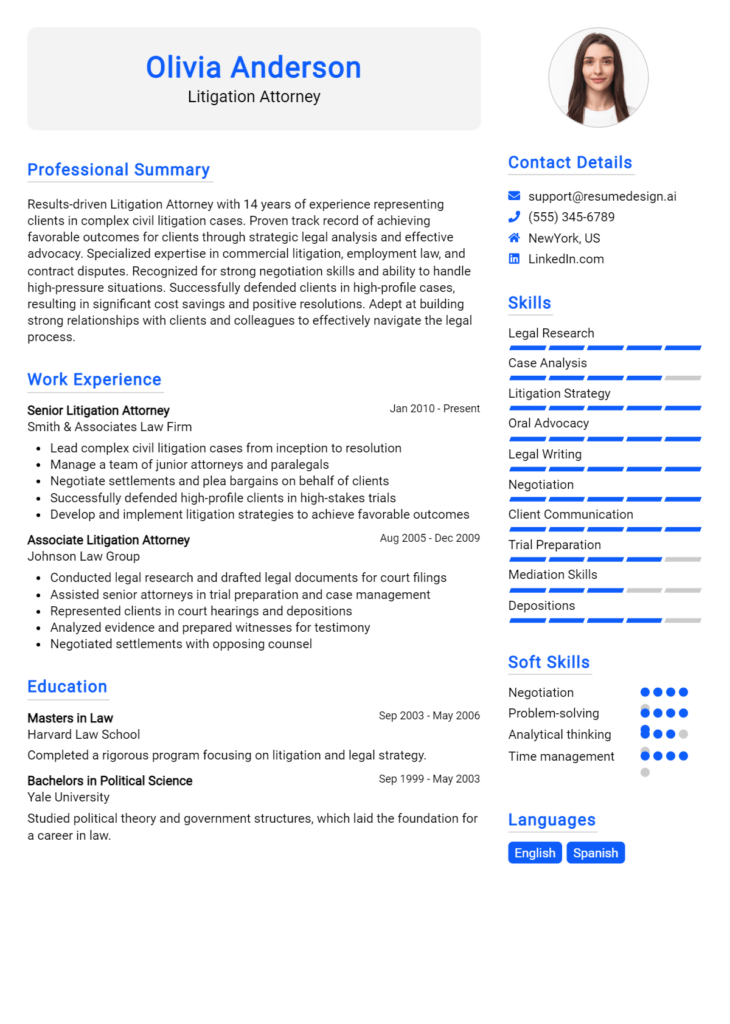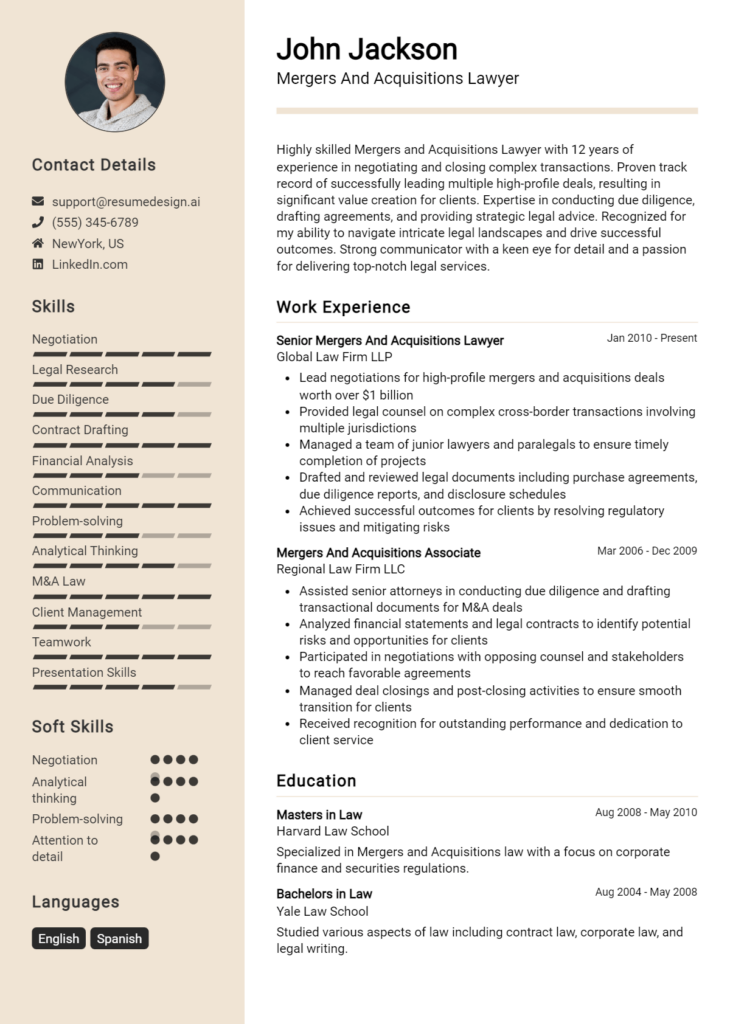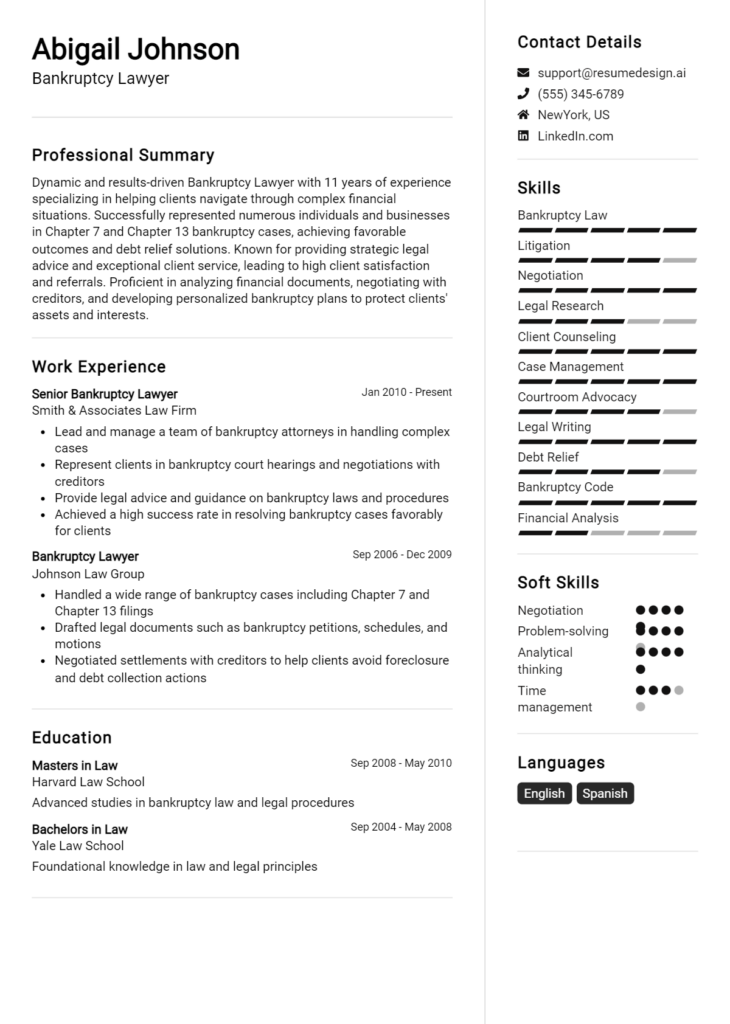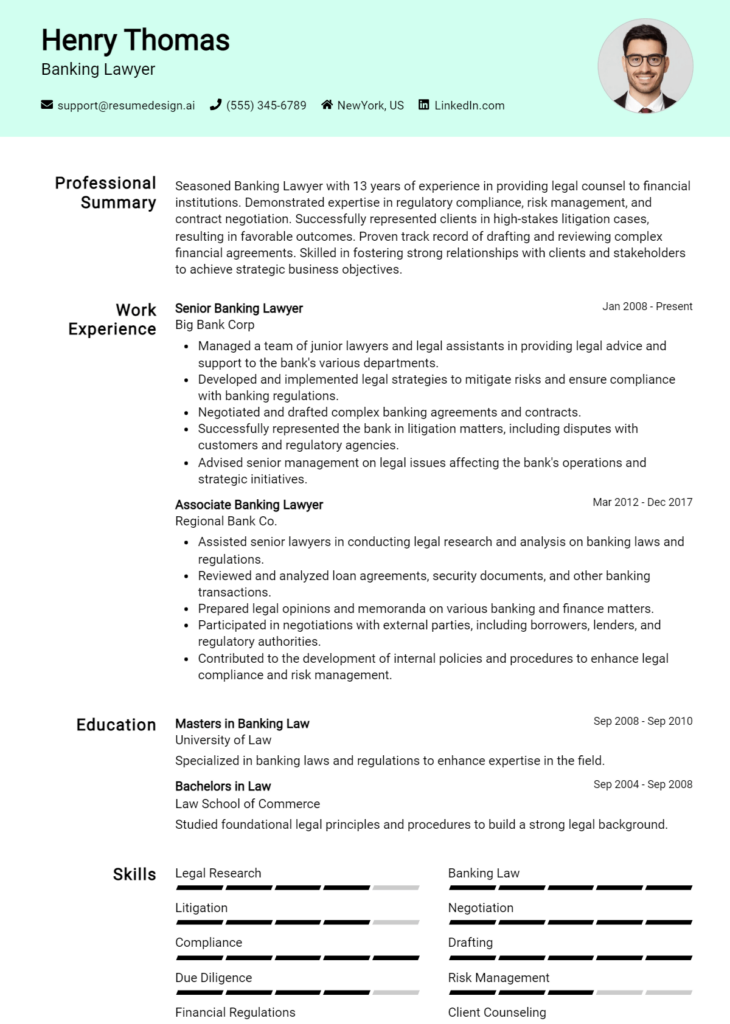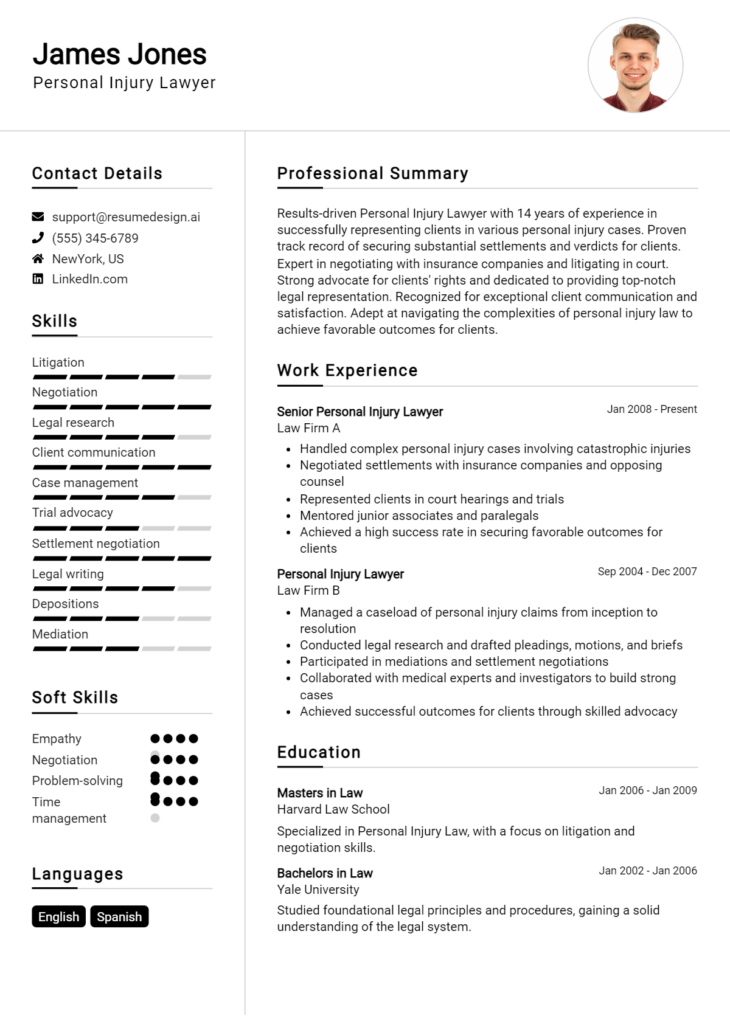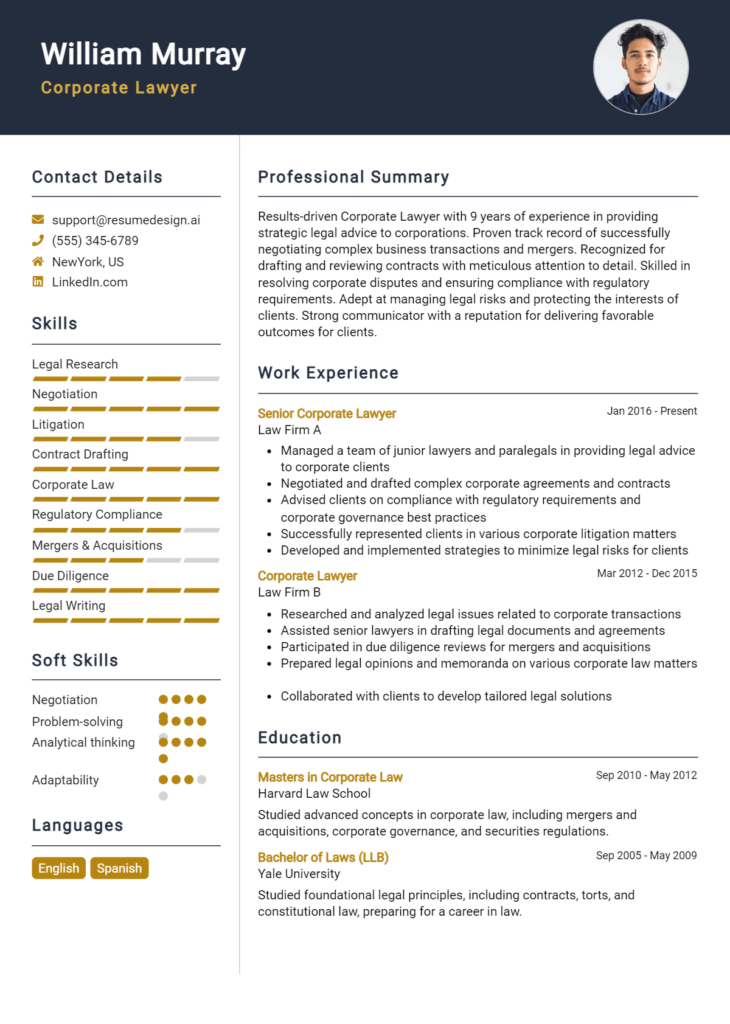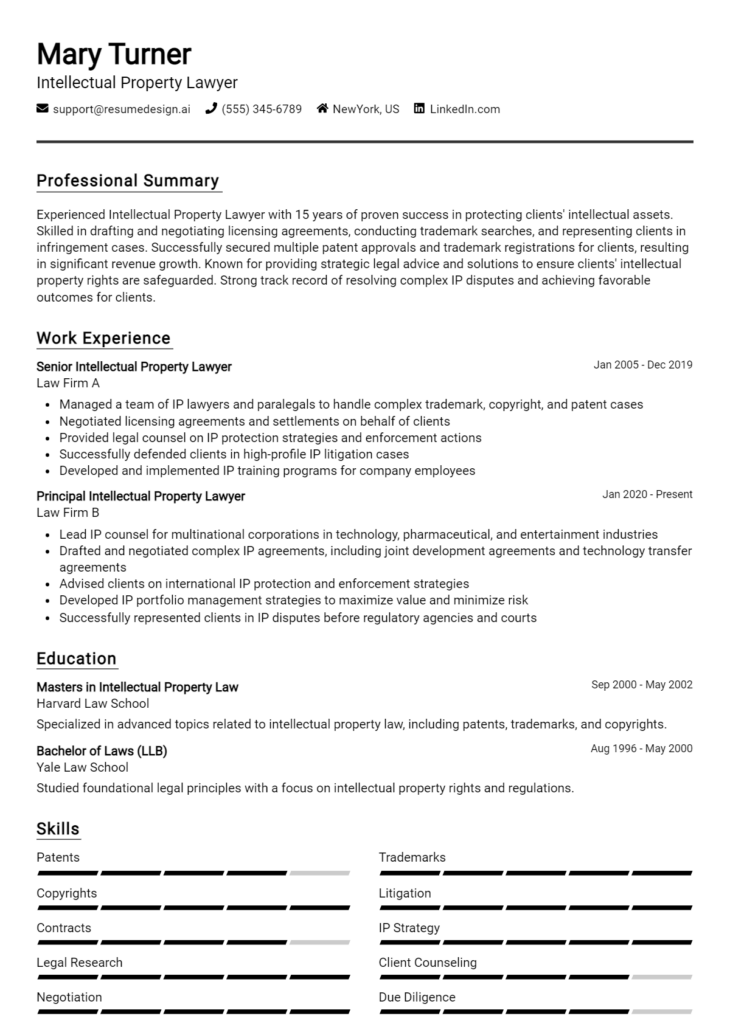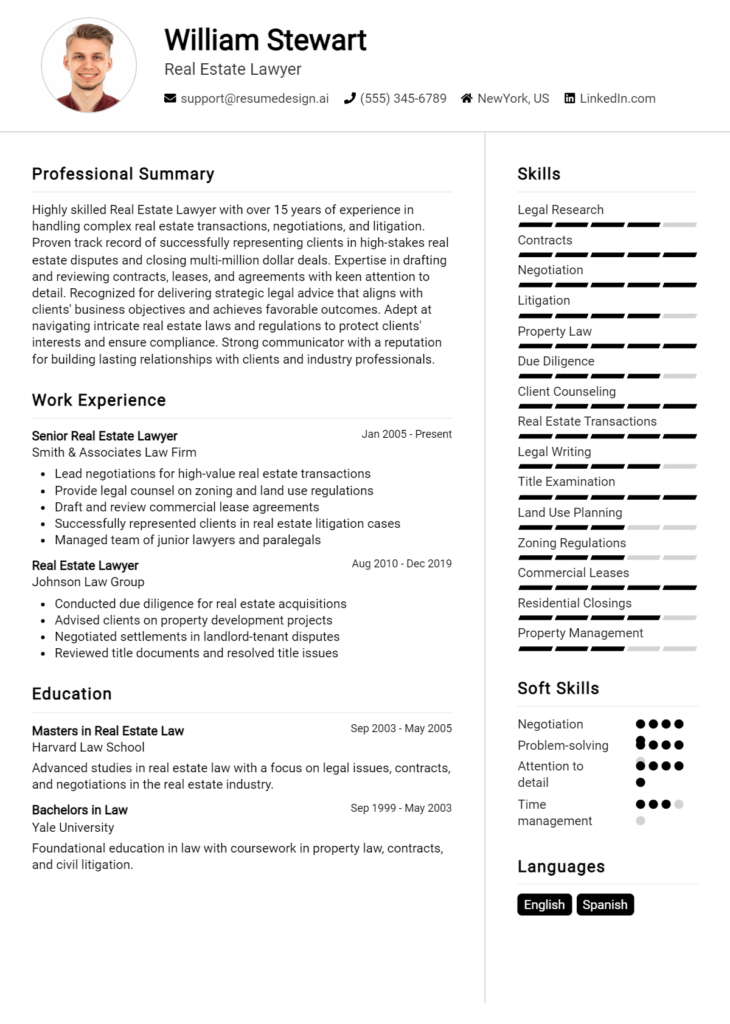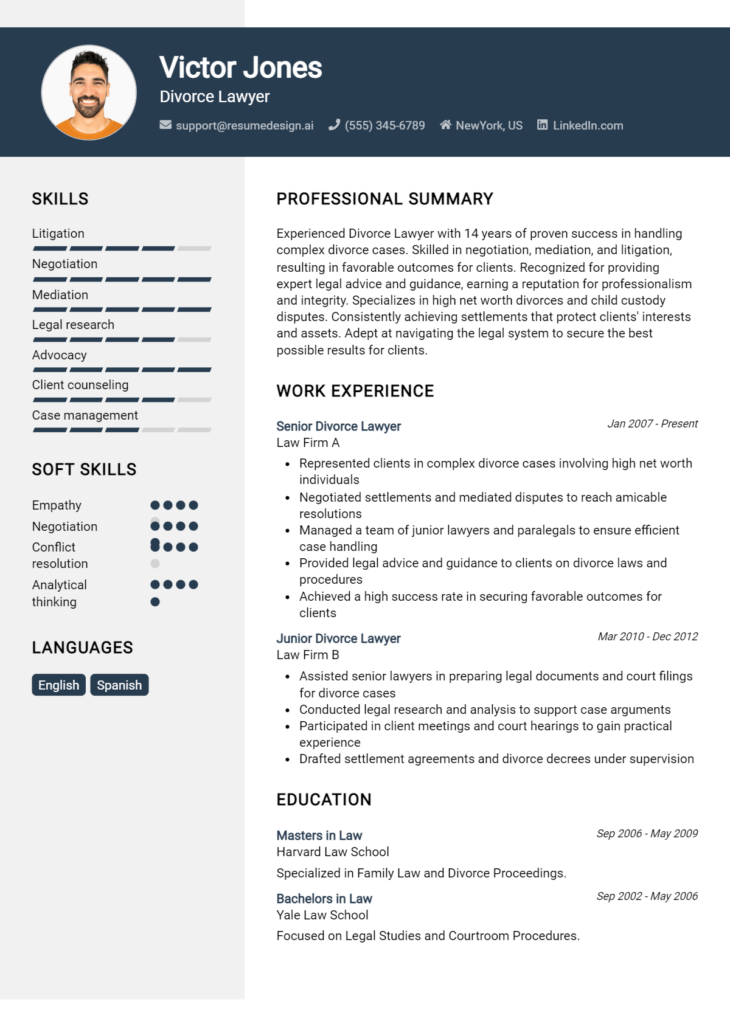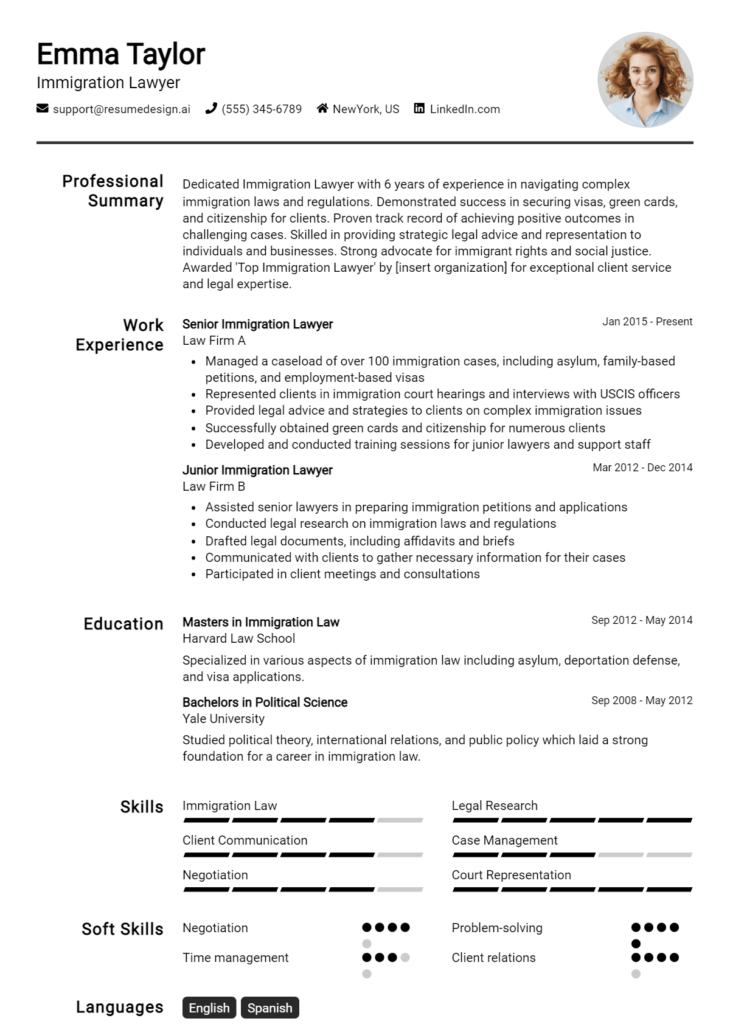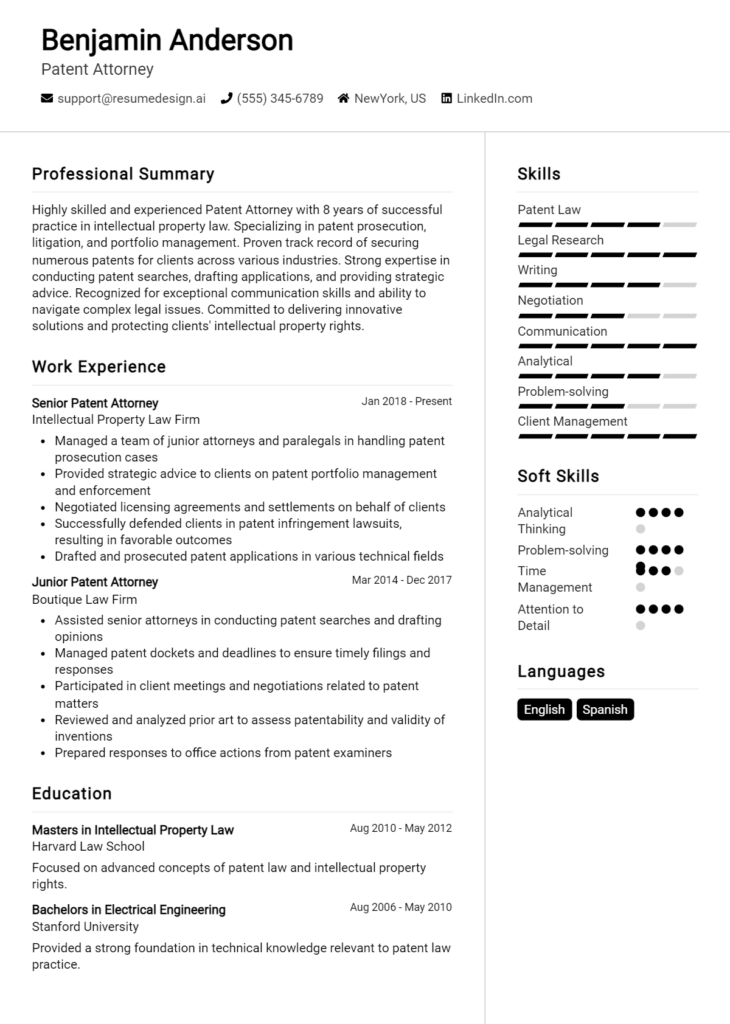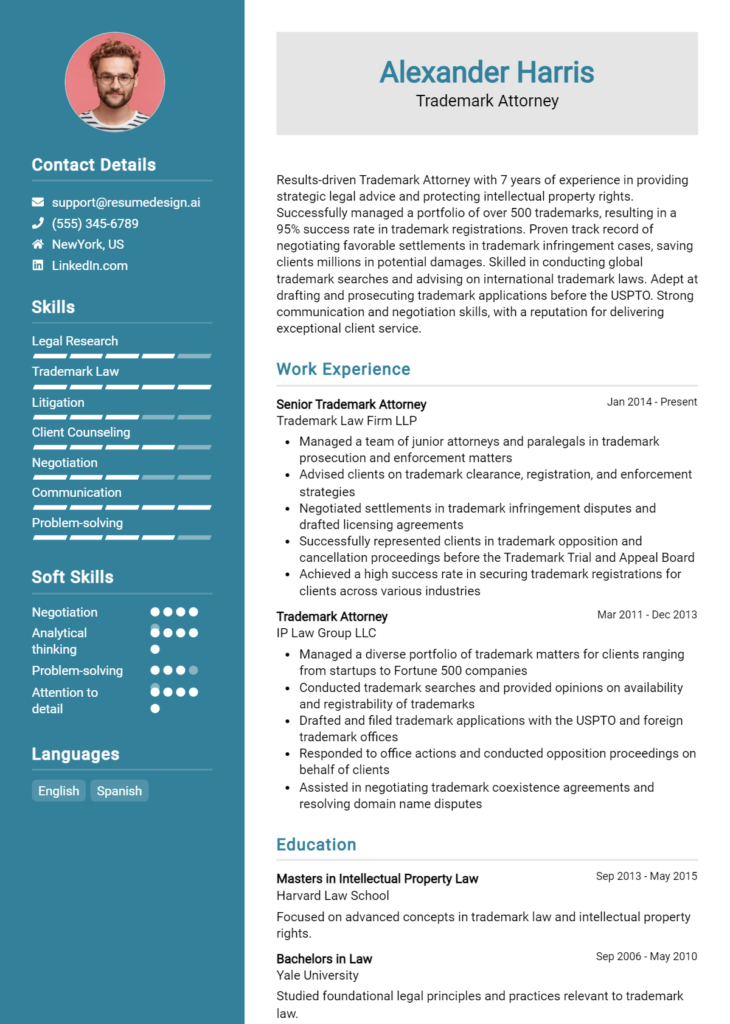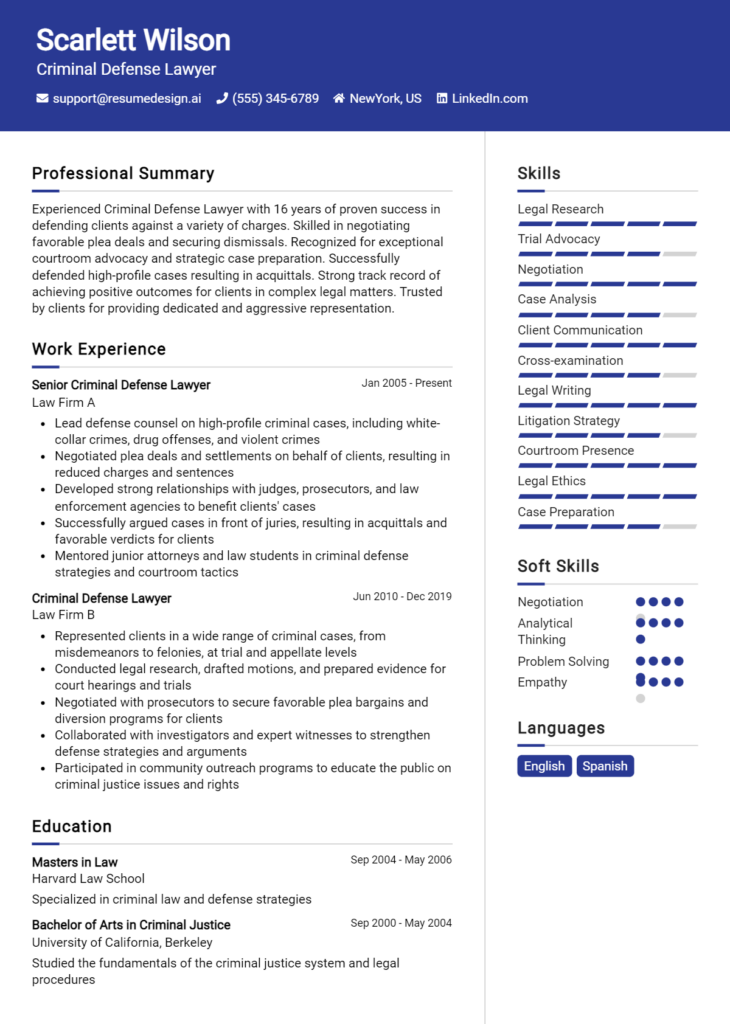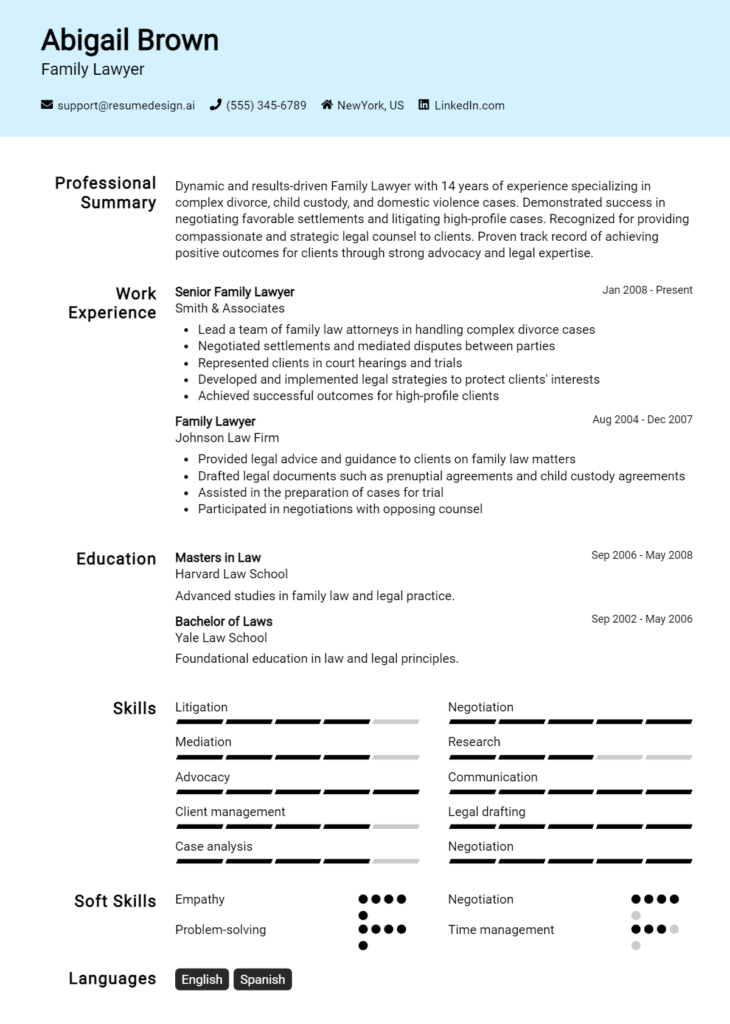Construction Lawyer Core Responsibilities
A Construction Lawyer plays a crucial role in navigating the legal complexities of construction projects, requiring a blend of technical, operational, and problem-solving skills. Key responsibilities include drafting and negotiating contracts, resolving disputes, and ensuring compliance with regulations. This role acts as a bridge among various departments, facilitating communication between legal, engineering, and project management teams. A well-structured resume that highlights these competencies is essential in demonstrating the lawyer's ability to contribute to the organization's overall goals effectively.
Common Responsibilities Listed on Construction Lawyer Resume
- Drafting and reviewing construction contracts and agreements
- Advising clients on regulatory compliance and risk management
- Representing clients in construction disputes and litigation
- Conducting legal research on construction law and regulations
- Negotiating settlements and alternative dispute resolutions
- Collaborating with project managers and engineers on legal matters
- Providing legal support for public procurement processes
- Reviewing and advising on insurance and bonding issues
- Conducting training on legal obligations for construction teams
- Assisting in the resolution of contract performance issues
- Monitoring changes in construction law and industry standards
- Preparing legal documents and correspondence
High-Level Resume Tips for Construction Lawyer Professionals
In the competitive field of construction law, a well-crafted resume is not just a document; it's a powerful tool that can open doors to new opportunities. As the first impression a potential employer gets of a candidate, the resume must effectively showcase both the skills and achievements that define a successful Construction Lawyer. A resume that is thoughtfully tailored to the nuances of the construction industry can significantly enhance a candidate's appeal to hiring managers. This guide will provide practical and actionable resume tips specifically designed for Construction Lawyer professionals to help them stand out in a crowded job market.
Top Resume Tips for Construction Lawyer Professionals
- Tailor your resume to match the job description by incorporating relevant keywords and phrases.
- Highlight your legal expertise in construction law, including experience with contracts, disputes, and regulatory compliance.
- Showcase your relevant experience in both litigation and negotiation, demonstrating versatility in handling construction-related cases.
- Quantify your achievements where possible, such as the value of contracts negotiated or the percentage of successful case outcomes.
- Include any specialized certifications or training in construction law, project management, or dispute resolution.
- Emphasize your understanding of construction industry standards and regulations to illustrate your niche knowledge.
- Demonstrate strong communication and interpersonal skills, which are essential for client interactions and negotiations.
- Utilize a clean and professional layout that enhances readability and ensures important information stands out.
- Consider adding a summary statement that encapsulates your unique qualifications and career objectives in construction law.
- Proofread thoroughly to eliminate any errors, as attention to detail is crucial in the legal profession.
By implementing these tips, Construction Lawyer professionals can significantly increase their chances of landing a job. A well-optimized resume that effectively highlights relevant experience, accomplishments, and industry-specific skills will capture the attention of hiring managers and set candidates on the path to success in their legal careers.
Why Resume Headlines & Titles are Important for Construction Lawyer
In the competitive field of construction law, a well-crafted resume headline or title plays a crucial role in capturing the attention of hiring managers. A strong headline can serve as a powerful summary of a candidate's key qualifications, effectively conveying their expertise and value in a single, impactful phrase. By being concise and directly relevant to the job being applied for, a headline not only piques interest but also sets the tone for the entire resume, making it essential for candidates to prioritize this element in their application materials.
Best Practices for Crafting Resume Headlines for Construction Lawyer
- Keep it concise: Aim for one impactful phrase that summarizes your qualifications.
- Be specific: Tailor your headline to highlight relevant skills and experiences in construction law.
- Use industry keywords: Incorporate terms commonly found in construction law job descriptions.
- Highlight your unique value: Focus on what sets you apart from other candidates.
- Prioritize clarity: Avoid jargon and ensure your headline is easily understandable.
- Showcase achievements: If possible, include quantifiable accomplishments that demonstrate your expertise.
- Reflect your career stage: Make sure your headline aligns with your level of experience, whether you’re an entry-level lawyer or a seasoned professional.
- Update regularly: Revise your headline for each application to ensure it matches the specific job role.
Example Resume Headlines for Construction Lawyer
Strong Resume Headlines
"Experienced Construction Lawyer Specializing in Contract Negotiation and Dispute Resolution"
“Results-Driven Legal Professional with 10+ Years in Construction Litigation and Compliance”
“Skilled Construction Attorney with Proven Track Record in Risk Management and Regulatory Affairs”
“Dedicated Construction Law Expert Focused on Protecting Client Interests and Minimizing Liabilities”
Weak Resume Headlines
“Lawyer Looking for Opportunities”
“Experienced Professional”
“Construction Lawyer with Various Skills”
The strong headlines are effective because they clearly articulate the candidate's expertise, specific skills, and achievements in construction law, making a memorable impression on hiring managers. They avoid generic language and instead emphasize the candidate's unique qualifications. In contrast, the weak headlines lack specificity and clarity, failing to provide any concrete information about the candidate’s skills or value, which can lead to them being overlooked in favor of more compelling resumes.
Writing an Exceptional Construction Lawyer Resume Summary
A well-crafted resume summary is crucial for a Construction Lawyer as it serves as the first impression for hiring managers. A strong summary succinctly captures the candidate's key skills, relevant experience, and notable accomplishments, thereby quickly engaging the reader's interest. In the competitive field of construction law, a concise and impactful summary tailored to the specific job can effectively highlight the candidate's qualifications and set them apart from others. This brief overview not only provides a snapshot of the candidate’s professional background but also demonstrates their understanding of the role and the unique demands of the construction industry.
Best Practices for Writing a Construction Lawyer Resume Summary
- Quantify achievements: Use numbers and statistics to demonstrate the impact of your work.
- Focus on relevant skills: Highlight specific legal skills and expertise pertinent to construction law.
- Tailor the summary: Customize the summary for each job application to align with the job description.
- Keep it concise: Aim for 3-5 sentences that convey your strengths without unnecessary detail.
- Use strong action verbs: Start sentences with dynamic verbs to create a sense of energy and accomplishment.
- Showcase industry knowledge: Mention familiarity with construction law regulations, contracts, and dispute resolution.
- Emphasize problem-solving abilities: Highlight experiences where you successfully resolved legal issues in construction.
- Incorporate keywords: Use industry-specific terminology to pass through Applicant Tracking Systems (ATS).
Example Construction Lawyer Resume Summaries
Strong Resume Summaries
Experienced Construction Lawyer with over 10 years of expertise in contract negotiation and dispute resolution, successfully representing clients in over 100 complex construction litigation cases, achieving a 90% win rate.
Accomplished legal professional specializing in construction law, with a track record of reducing contract disputes by 40% through effective mediation and compliance strategies for leading construction firms.
Detail-oriented Construction Lawyer with a proven history of advising on multimillion-dollar projects, ensuring compliance with state regulations, and mitigating risks, resulting in a 25% decrease in project delays.
Skilled in construction contracts and regulatory compliance, I have successfully negotiated terms for projects valued at over $500 million, enhancing operational efficiency and minimizing legal exposure for clients.
Weak Resume Summaries
I am a Construction Lawyer with experience in various legal matters related to construction.
Legal professional looking for opportunities in construction law, with some previous work experience in the area.
The strong resume summaries are effective because they provide specific examples of achievements, quantify results, and are tailored to the construction law field, which demonstrates the candidate's expertise and relevance to the role. In contrast, the weak summaries lack detail, do not highlight specific achievements, and appear too generic, making it difficult for hiring managers to gauge the candidate's qualifications and contributions to the field.
Work Experience Section for Construction Lawyer Resume
The work experience section of a Construction Lawyer resume is vital as it serves as a platform to showcase the candidate's technical skills, ability to manage teams, and deliver high-quality legal products. This section not only highlights the intricacies of legal expertise in construction but also demonstrates how the candidate has effectively navigated complex projects and legal challenges. Quantifying achievements—such as the successful negotiation of multi-million dollar contracts or a reduction in litigation costs—is crucial as it provides tangible evidence of the candidate's capabilities. Aligning this experience with industry standards further enhances credibility and relevance, making a compelling case for the candidate's fit in the construction legal landscape.
Best Practices for Construction Lawyer Work Experience
- Highlight specific legal skills related to construction law, such as contract negotiation, dispute resolution, and regulatory compliance.
- Quantify achievements where possible, using metrics like contract values, cost savings, or project timelines to illustrate impact.
- Showcase experience in managing or collaborating with multidisciplinary teams, emphasizing leadership roles and teamwork.
- Include relevant certifications or continuing education that demonstrate ongoing professional development in construction law.
- Tailor the work experience descriptions to align with the specific requirements of the construction law field.
- Use action verbs to convey a sense of initiative and responsibility, creating a dynamic narrative of your career journey.
- Incorporate industry-specific terminology to reflect familiarity with construction practices and legal frameworks.
- Focus on outcomes and results achieved rather than just listing duties or responsibilities.
Example Work Experiences for Construction Lawyer
Strong Experiences
- Successfully negotiated a $10 million construction contract, resulting in a 15% cost reduction for the client while ensuring compliance with all regulatory requirements.
- Led a team of five attorneys in a multi-party litigation case, achieving a settlement that saved the client over $2 million in potential damages.
- Developed and implemented a comprehensive risk management strategy for a major construction firm, reducing legal disputes by 30% over two years.
- Collaborated with project managers and engineers to draft and review contracts, resulting in a 25% increase in project completion efficiency.
Weak Experiences
- Worked on various construction law cases.
- Participated in contract negotiations.
- Assisted in legal research for construction projects.
- Reviewed documents related to construction law.
The examples listed as strong experiences are considered effective because they provide specific, quantifiable outcomes that demonstrate the candidate's technical expertise and leadership abilities in construction law. They illustrate a direct impact on projects and clients, showcasing collaboration and strategic thinking. In contrast, the weak experiences lack detail and measurable results, making them less compelling. They fail to convey the candidate's contributions meaningfully, leaving potential employers with a vague understanding of the candidate's capabilities and achievements.
Education and Certifications Section for Construction Lawyer Resume
The education and certifications section of a Construction Lawyer resume plays a pivotal role in establishing the candidate's qualifications and expertise within the legal and construction industries. This segment not only showcases the academic background of the applicant but also emphasizes their commitment to continuous learning through relevant certifications and specialized training. By detailing pertinent coursework and industry-recognized credentials, candidates can significantly enhance their credibility and demonstrate their alignment with the specific demands of the job role, making a compelling case for their suitability to potential employers.
Best Practices for Construction Lawyer Education and Certifications
- Prioritize relevant degrees such as Juris Doctor (JD) with a focus on construction law or real estate law.
- Include certifications from recognized institutions, such as the American Bar Association or specific construction law certifications.
- Highlight any specialized training in construction management, contract negotiation, or dispute resolution.
- Detail relevant coursework that pertains to construction law, contracts, or regulatory compliance.
- Maintain clarity and conciseness, ensuring that details are easy to read and understand.
- Stay current with industry trends and continuously update credentials as necessary.
- Be honest about qualifications; misrepresentations can damage credibility.
- Consider including memberships in professional organizations related to construction law.
Example Education and Certifications for Construction Lawyer
Strong Examples
- Juris Doctor (JD), University of California, Berkeley, School of Law, 2015
- Certified Construction Contract Administrator (CCCA), Construction Specifications Institute
- Master of Laws (LLM) in Construction Law, University College London, 2018
- Relevant Coursework: Advanced Contract Law, Construction Litigation, and Regulatory Compliance
Weak Examples
- Bachelor of Arts in English Literature, University of Texas, 2010
- Certification in Basic Office Management, Local Community College
- High School Diploma, Central High School, 2006
- Outdated certification in General Legal Studies, obtained in 2010
The strong examples are considered effective because they directly align with the requirements of a Construction Lawyer, showcasing relevant legal education and specialized credentials that highlight the candidate's expertise in construction law. In contrast, the weak examples are deemed ineffective due to their lack of relevance to the construction law field, outdated qualifications, and failure to demonstrate specific skills or knowledge necessary for the role. This distinction underscores the importance of selecting educational experiences and certifications that resonate with the job's demands.
Top Skills & Keywords for Construction Lawyer Resume
In the competitive field of construction law, showcasing the right skills on your resume is crucial for standing out to potential employers. A well-crafted resume not only highlights your legal expertise but also reflects your ability to navigate the complexities of construction projects and disputes. By emphasizing both soft and hard skills, you can demonstrate your comprehensive understanding of the legal landscape, as well as your interpersonal abilities that are essential for effective negotiation and client relations. This blend of skills is vital for a Construction Lawyer, as it showcases your readiness to handle the multifaceted challenges within this specialized area of law.
Top Hard & Soft Skills for Construction Lawyer
Soft Skills
- Excellent communication
- Strong negotiation abilities
- Critical thinking
- Problem-solving skills
- Attention to detail
- Team collaboration
- Time management
- Adaptability
- Client relationship management
- Conflict resolution
- Leadership skills
- Emotional intelligence
- Persuasiveness
- Active listening
Hard Skills
- Knowledge of construction law
- Contract drafting and review
- Regulatory compliance
- Risk assessment
- Legal research and writing
- Litigation experience
- Mediation and arbitration
- Familiarity with construction contracts (e.g., AIA, DBIA)
- Project management principles
- Understanding of zoning laws
- Familiarity with insurance issues in construction
- Knowledge of environmental regulations
- Ability to interpret blueprints and specifications
- Construction project financing
- Expertise in dispute resolution techniques
For a deeper understanding of how to effectively convey these skills on your resume, consider reviewing your work experience to align relevant examples with the skills listed.
Stand Out with a Winning Construction Lawyer Cover Letter
Dear [Hiring Manager's Name],
I am writing to express my interest in the Construction Lawyer position at [Company Name], as advertised on [Where You Found the Job Posting]. With a robust background in construction law and a deep understanding of the complexities of the construction industry, I am well-equipped to provide exceptional legal counsel and support to your clients. My experience includes advising on contract negotiations, resolving disputes, and ensuring compliance with relevant regulations, making me a valuable asset to your team.
Throughout my [X years] of experience, I have successfully represented clients in various construction-related matters, from drafting and reviewing contracts to navigating litigation. My ability to build strong relationships with stakeholders has proven essential in facilitating effective communication and collaboration across projects. At [Previous Company Name], I played a key role in resolving a multi-million dollar dispute involving contract breaches and project delays, ultimately saving our client significant resources while ensuring a fair and just outcome.
I am particularly impressed by [Company Name]'s commitment to excellence and its reputation in the industry. I am eager to contribute to your team by leveraging my skills in legal analysis, negotiation, and problem-solving. I am confident that my proactive approach and dedication to client service will align with your firm's values and goals. I look forward to the opportunity to further discuss how I can contribute to your continued success in the construction sector.
Thank you for considering my application. I hope to bring my expertise and passion for construction law to [Company Name] and look forward to the possibility of discussing my candidacy in more detail.
Sincerely,
[Your Name]
[Your Contact Information]
Common Mistakes to Avoid in a Construction Lawyer Resume
A well-crafted resume is essential for any Construction Lawyer seeking to advance their career in the construction and legal fields. However, many candidates make common mistakes that can undermine their qualifications and hinder their chances of landing a job. By avoiding these pitfalls, you can create a more compelling resume that effectively showcases your skills and experience. Here are some common mistakes to watch out for:
Generic Objective Statement: Using a vague or generic objective statement fails to convey your specific goals and can make your resume blend in with others. Tailor it to highlight your expertise in construction law.
Lack of Relevant Experience: Failing to emphasize your relevant experience in construction law can lead hiring managers to overlook your qualifications. Be sure to highlight your experience with construction contracts, disputes, and regulatory compliance.
Ignoring Keywords: Not incorporating industry-specific keywords can make your resume less visible to applicant tracking systems. Research job descriptions to identify and use terms that employers are seeking.
Overloading with Legal Jargon: While it’s important to demonstrate your legal knowledge, overusing complex legal terminology can alienate non-legal hiring managers. Strive for clarity and conciseness.
Omitting Soft Skills: Construction law often requires strong negotiation and communication skills. Neglecting to mention these soft skills may give the impression that you lack interpersonal abilities critical for the role.
Inconsistent Formatting: Using inconsistent formatting can distract from your qualifications and make your resume look unprofessional. Maintain a clean, uniform layout throughout your document.
Failing to Quantify Achievements: Not providing quantifiable achievements can weaken your impact. Use numbers and statistics to demonstrate your contributions, such as successfully resolving disputes or saving clients money.
Neglecting Continuing Education: Omitting information about relevant certifications or continuing education can suggest a lack of commitment to professional development. Highlight any specialized training or courses that enhance your qualifications.
Conclusion
As we have explored the essential responsibilities and skills of a Construction Lawyer, it's important to recognize the competitive nature of this field. Construction Lawyers play a vital role in navigating complex legal issues that arise in construction projects, from contract negotiations to dispute resolution. Their expertise not only protects the interests of clients but also ensures compliance with relevant laws and regulations.
To stand out in this demanding industry, having a well-crafted resume is crucial. Highlighting your relevant experience, specialized knowledge, and key accomplishments will increase your chances of securing the position you desire.
We encourage you to take the time to review your Construction Lawyer resume and ensure it effectively showcases your qualifications. Utilize available resources to enhance your application. Explore tools like resume templates for professional layouts, a resume builder for easy customization, resume examples for inspiration, and cover letter templates to complement your application.
Act now to refine your resume and make a lasting impression in your pursuit of a successful career as a Construction Lawyer!

